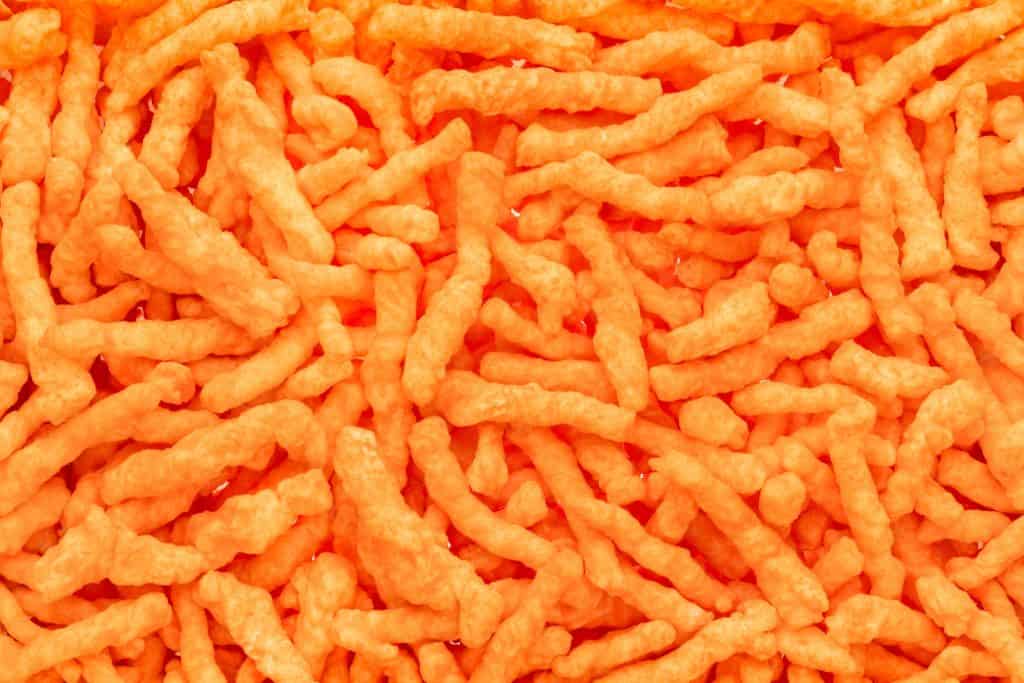Hot Cheetos are a pretty enjoyable snack, but being a prospective mother changes your situation – even as early as the first trimester! Can you still enjoy hot Cheetos while pregnant?
While hot Cheetos won’t endanger your pregnancy, they’re still pretty unhealthy. Hot Cheetos are filled with loads of salt, food coloring, and artificial flavorings.
The sodium content increases fluid retention, which then leads to higher blood pressure during pregnancy and a greater likelihood of birth complications. High sodium content also damages the child’s kidneys, possibly impairing their long-term functionality after birth.
Additionally, eating spicy snacks during pregnancy is generally ill-advised, as the chemical responsible for the “heat” (capsaicin) can induce indigestion or heartburn. This is already unpleasant in the first trimester but gets even worse as the pregnancy progresses.
You can enjoy hot Cheetos while pregnant, but only slowly and in moderation – though you’d be better off in the long run either ditching or severely curbing your junk food habit after the first trimester. We’ll go over why that’s best for you and your baby down below.
Can I Have Hot Cheetos During Pregnancy?
They Aren’t Dangerous, but Unhealthy

Hot Cheetos may not have the same degree of contamination risk as other foods (like frogs legs!) have, but they’re still processed foods primarily composed of unhealthy ingredients.
The biggest thing that makes hot Cheetos risky for pregnancy is their high sodium content. This ends up retaining more fluid in the mother’s body, which causes their extremities to swell up. It raises their blood pressure, which causes a dangerous, complication-prone situation for the fetus.
Artificial flavorings and colorings are also pretty problematic and may trigger allergic reactions for either the mother, the fetus, or both. Artificial flavorings may also carry additional sodium as well, further compounding the prior risk and making hot Cheetos even less safe for pregnant moms.
On a more general health basis, overindulging in hot Cheetos – or any processed junk food, for that matter – has been linked to poor birth outcomes. This type of unhealthy diet has been linked to gestational diabetes, low birth weights, and even premature births.
The worst part is how filling hot Cheetos are, due to their poor nutritional value and high caloric density. Hot Cheetos are pretty unhealthy, but even if they weren’t they’d still badly stunt your appetite for more nutritional meals – depriving you and your infant of crucial vitamins, minerals, and proteins that both of you sorely need!
Spiciness and Pregnancy

Spicy foods are not for everyone, but this is especially crucial for pregnant women. A person’s tolerance for spice isn’t universal, and overdoing it can lead to indigestion, stomach cramps, and heartburn. Some even believe that spicy foods can prematurely induce labor – though there’s admittedly little objective evidence to support the claim.
What we can guarantee is that all of these conditions are uncomfortable on their own – having to deal with them on top of pregnancy will be a nightmare, even for tough moms!
If you still want to eat hot Cheetos while pregnant, you can still do so – provided you stick with small portions and a slow pace. Remember that you’re eating for two here, so don’t overdo it!
On a similar note, while many pregnant women might crave bubble tea, perhaps as a soothing counter to the spiciness of foods like Hot Cheetos, it’s essential to be cautious about its caffeine and sugar content. Just like other beverages, moderation and careful selection of ingredients are crucial when enjoying bubble tea during pregnancy.
Final Thoughts
So, can you have Hot Cheetos while pregnant? There isn’t much specific research about hot Cheetos and pregnancy safety, but we do know that it’s still processed junk food you’re putting in your body here! You can indulge a bit from time to time, but hot Cheetos are objectively unhealthy – never gorge to the point where you’re starting to skimp out on healthier foods. Aim for a balanced diet that meets all your nutritional needs.
That said, always ask your healthcare provider or obstetrician first! They’ll know way more about your current situation, and can offer specific pointers on first-trimester nutrition and snacking.